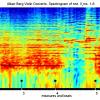Hippocampal size positively correlates with verbal IQ in male children.
Schumann CM, Hamstra J, Goodlin-Jones BL, Kwon H, Reiss AL, Amaral DG.
Source
Department of Psychiatry and Behavioral Sciences and M.I.N.D. Institute, University of California, Davis, CA 95817, USA.
Abstract
Historically, there have been numerous proposals that the size of the brain correlates with its capacity to process information. Little is known, however, about which specific brain regions contribute to this correlation in children and adolescents. This study evaluated the relationship between intelligence and the size of various brain structures in typically developing male children 8-18 yrs of age. Magnetic resonance imaging (MRI) scans were used to measure the volume of the cerebrum, cerebral gray and white matter, cerebellum, amygdala, and hippocampus. Gray matter and hippocampal volume significantly correlated with full scale and verbal IQ. Since the hippocampus strongly correlated with verbal but not performance IQ, our findings reinforce the hypothesis that the hippocampus is involved in declarative and semantic learning, which contributes more notably to verbal IQ, than to performance IQ. Given the substantial evidence for environmentally induced changes in hippocampal structure, an unresolved issue is whether this relationship reflects genetically determined individual variation or learning induced plasticity.
© 2007 Wiley-Liss, Inc. PMID: 17407128 [PubMed - indexed for MEDLINE]
Hippocampal Size Predicts Antidepressant Response
Pam HarrisonNov 16, 2012
Larger hippocampal volume predicts antidepressant treatment response in individuals with late-life depression, new research suggests.
Results of the 12-week study showed that smaller pretreatment hippocampal volumes significantly predicted a slower rate of change in Montgomery-Ǻsberg Depression Rating Scale (MADRS) scores from baseline to the end of the 12-week study.
In addition, the researchers found that slower cognitive processing speed significantly predicted a slower rate of change in depression scores.
"Studies have shown that late-life depression may be associated with certain structural changes in the brain, including shrinkage in certain regions," Dr. Murali Doraiswamy, MD, Duke University School of Medicine, Durham, North Carolina, told Medscape Medical News.
"But it has never been tested as to whether these structural changes alter response to antidepressant therapy or not. In this study, we found that they did."
The study is published in the November issue of the American Journal of Psychiatry.
Slower Response Rate
A total of 158 patients with late-life depression were recruited from the National Institute of Mental Health–sponsored Treatment Outcome in Vascular Depression study.
In addition, 57 control participants who were matched for vascular risk factor profiles but who had no history of depression were recruited from the community.
The study's primary outcome measure was the change in MADRS scores; MADRS scores were tracked weekly from baseline for 12 weeks.
Patients were initially treated with sertraline 25 mg for 1 day, after which the dose was slowly titrated up to a maximum dose of 200 mg a day on the basis of treatment response and adverse effects.
The investigators first compared patients with depression to the comparator group to generate regions of interest in the brain for testing the effects on treatment outcome.
After adjusting for all possible confounders, "only smaller hippocampal volume predicted a slower rate of response to antidepressant treatment," they write.
In a confirmatory analysis, investigators also examined which baseline volume and thickness variables differed between depressed patients who achieved remission and those who did not.
"Patients who did not achieve remission had significant smaller hippocampal volumes and thinner front poles than those who did achieve remission," they add.
Table: MRI Volumes Did Not Achieve Remission (n = 94) Achieved Remission (n = 64) Hippocampus volume (mm3) 7942.3 8298.2 Frontal pole thickness (mm) 5.5 5.8
"The clinical implication of this study is that patients with late-life depression who have small hippocampal volumes and slow cognitive processing speed are likely to have a slower as well as a less complete recovery," investigators conclude.

Essential Next Step
In an accompanying editorial, Susan Schultz, MD, University of Iowa College of Medicine, Iowa City, said that in order to gain a greater understanding of late-life depression, studies must "reach beyond examining a confluence of risk factors and [move] toward an understanding of pathogenesis." She added that the current study "represents one step in doing just that, but additional work exploring specific pathogenic processes affecting the hippocampus in late life may be the essential next step."
The study was funded by a collaborative grant for Clinical Studies of Mental Disorders. Dr. Doraiswamy reports receiving research support or honoraria from a number of pharmaceutical companies. The other investigators have disclosed no relevant financial relationships. Dr. Schultz reports receiving research funding from the Alzheimer's Disease Cooperative Study, Baxter Healthcare, and the Nellie Ball Trust Fund.
Am J Psychiatry. 2012:169;1185-1193; 1133-1136.
Hippocampal size predicts rapid learning of a cognitive map in humans
- Victor R. Schinazi1,*,
- Daniele Nardi2,
- Nora S. Newcombe2,
- Thomas F. Shipley2,
- Russell A. Epstein1
Article first published online: 18 MAR 2013
DOI: 10.1002/hipo.22111
Copyright © 2013 Wiley Periodicals, Inc.
Abstract
The idea that humans use flexible map-like representations of their environment to guide spatial navigation has a long and controversial history. One reason for this enduring controversy might be that individuals vary considerably in their ability to form and utilize cognitive maps. Here we investigate the behavioral and neuroanatomical signatures of these individual differences. Participants learned an unfamiliar campus environment over a period of three weeks. In their first visit, they learned the position of different buildings along two routes in separate areas of the campus. During the following weeks, they learned these routes for a second and third time, along with two paths that connected both areas of the campus. Behavioral assessments after each learning session indicated that subjects formed a coherent representation of the spatial structure of the entire campus after learning a single connecting path. Volumetric analyses of structural MRI data and voxel-based morphometry (VBM) indicated that the size of the right posterior hippocampus predicted the ability to use this spatial knowledge to make inferences about the relative positions of different buildings on the campus. An inverse relationship between gray matter volume and performance was observed in the caudate. These results suggest that (i) humans can rapidly acquire cognitive maps of large-scale environments and (ii) individual differences in hippocampal anatomy may provide the neuroanatomical substrate for individual differences in the ability to learn and flexibly use these cognitive maps. © 2013 Wiley Periodicals, Inc.
Species differences in executive function correlate with hippocampus volume and neocortex ratio across nonhuman primates.
Shultz S, Dunbar RI
British Academy Centenary Research Project, Institute of Cognitive & Evolutionary Anthropology, University of Oxford, 64 Banbury Rd, Oxford OX2 6PN, England. susanne.shultz@anthro.ox.ac.uk
Journal of Comparative Psychology (Washington, D.C. : 1983) [2010, 124(3):252-260]
Type: Journal Article, Research Support, Non-U.S. Gov't, Comparative Study
DOI: 10.1037/a0018894 
Abstract
A persistent debate in behavioral research is whether brain size or architecture relates to cognitive performance. A growing body of evidence has demonstrated correlations between brain size and ecological and behavioral tasks. These studies are premised on a causal link between brain size and cognitive function, although this association has little empirical backing. We show, for a set of 46 species from 17 primate genera, that competence on a series of eight executive function cognitive tasks both correlate across tasks and with brain size and architecture across species. Our model selection approach showed that, although several measures of brain component volumes are significantly associated with performance, hippocampus size is the best predictor of overall performance. The best performing model also includes total brain size and relative neocortex size. Additionally, absolute measures are much more predictive of performance than relative measures of brain and brain component size. These results are consistent with the hippocampus' role in learning, and the executive brain (neocortex) being important for problem solving and consolidation. Our findings challenge and extend those of previous analyses by clarifying the relationship between overall brain size and specific regional volumes. They also suggest that commonly used indices of encephalization, such as residuals of brain volume regressed on body size, may confound rather than clarify matters.
Permanent URL to this publication: http://dx.doi.org/10.5167/uzh-36673
Irle, E; Ruhleder, M; Lange, C; Seidler-Brandler, U; Salzer, S; Dechent, P; Weniger, G; Leibing, E; Leichsenring, F (2010). Reduced amygdalar and hippocampal size in adults with generalized social phobia. Journal of Psychiatry and Neuroscience, 35(2):126-131.  PDF
PDF
144Kb
Abstract
BACKGROUND: Structural and functional brain imaging studies suggest abnormalities of the amygdala and hippocampus in posttraumatic stress disorder and major depressive disorder. However, structural brain imaging studies in social phobia are lacking.
METHODS: In total, 24 patients with generalized social phobia (GSP) and 24 healthy controls underwent 3-dimensional structural magnetic resonance imaging of the amygdala and hippocampus and a clinical investigation.
RESULTS: Compared with controls, GSP patients had significantly reduced amygdalar (13%) and hippocampal (8%) size. The reduction in the size of the amygdala was statistically significant for men but not women. Smaller right-sided hippocampal volumes of GSP patients were significantly related to stronger disorder severity.
LIMITATIONS: Our sample included only patients with the generalized subtype of social phobia. Because we excluded patients with comorbid depression, our sample may not be representative.
CONCLUSION: We report for the first time volumetric results in patients with GSP. Future assessment of these patients will clarify whether these changes are reversed after successful treatment and whether they predict treatment response.
Hippocampus, whatever it is and does, seems determinative of global brain and mental health. And more size always correlates with positive things I would say.
We must suppose, when hippocampus grow, it will be even more protected against the size decrease.
























































